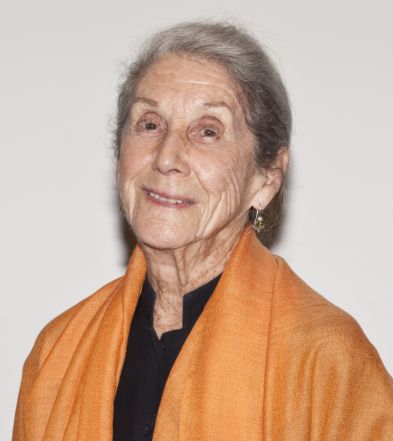
Nadine Gordimer
- South Africa
- Zu Gast beim ilb: 2001, 2009
Nadine Gordimer was born in the South African mining town of Springs in 1923. Gordimer, the daughter of Jewish immigrants, published her first story at the age of 15. She studied Humanities in Johannesburg but soon began to concentrate entirely on her writing. In 1949 she published her first collection of short stories. This was followed in 1953 by the highly autobiographical novel ‘Lying Days’. In the late 1950s Gordimer was introduced to Adalbert Luthuli, then president of the African National Congress (ANC). Her political campaigning against the apartheid laws and for racial equality soon made her persona non grata in South Africa. The ban of her novel ‘Burger’s Daughter’ in 1979 was only lifted following protests from famous authors, including Heinrich Böll. When Gordimer, who joined the ANC in 1990, was honoured with the Noble Prize for Literature in 1991, South African president F. W. de Klerk acknowledged her achievement with stony silence.
Gordimer, one of the most significant authors alive in the realm of world literature, won international renown early in her career. Her first stories appeared in ‘The Yale Review’ and ‘The New Yorker’, and most of the publishers of her later works were in New York and London. In 1979 Gordimer was vice-president of the International PEN Club. She has won numerous awards, including the 1974 Booker Prize for ‘The Conservationist’ and Darmstadt’s Nelly-Sachs-Preis in 1985. She has held guest lectureships in the U.S. and, in 1995 in India. She received her 14th honorary doctorate in 1992 from Cambridge. Although the question of colonised Africa’s future and Gordimer’s fight against racism unmistakeably permeate her writing, the description »’crusading literature’ does not do justice to her prose. In fact she does not consider herself as a predominantly political author. She once said “I am an apolitical person in a situation in which you have to be political to make an impact. All I have to offer is my writing talent”. This talent has allowed her make the world understand “the extent to which apartheid has disrupted normal people’s lives”. Since the end of apartheid, the themes and characters in Gordimer’s novels have changed. Yet the author’s unerring power of observation remains, as does her perception of the psychology of the individual in a particular (social or political) situation.
The author died on July 13, 2014.
© international literature festival berlin
Entzauberung
Fischer
Berlin, 1959
[Ü: Wolfgang von Einsiedel]
Der Besitzer
Claassen
Düsseldorf, 1977
[Ü: Victoria Wocker]
Burgers Tochter
Fischer
Frankfurt/Main, 1981
[Ü: Margaret Carroux]
Gutes Klima, nette Nachbarn
Fischer
Frankfurt/Main, 1982
[Ü: Walter Harmann]
July´s Leute
Fischer
Frankfurt/Main, 1982
[Ü: Margaret Carroux]
Der Ehrengast
Fischer
Frankfurt/Main, 1986
[Ü: Klaus Hoffer]
Die Geschichte meines Sohnes
Fischer
Frankfurt/Main, 1991
[Ü: Stefanie Schaffer de Vries]
Die sanfte Stimme der Schlange
Fischer
Frankfurt/Main, 1995
[Ü: Katrin von Hutten]
Niemand der mit mir geht
Berlin Verlag
Berlin, 1995
[Ü: Friedericke Kuhn]
Die Hauswaffe
Berlin Verlag
Berlin, 1998
[Ü: Susanne Höbel]
Die Umarmung eines Soldaten
Fischer
Frankfurt/Main, 1999
[Ü: Anne Steeb]
Zwischen Hoffnung und Geschichte. Notizen aus unserem Jahrhundert
Berlin Verlag
Berlin, 2000
[Ü: Susanne Höbel]
Beute
Berlin Verlag
Berlin, 2003
[Ü: Barbara Schaden]
Fremdling unter Fremden
Fischer
Frankfurt/Main, 2004
[Ü: Wolfgang von Einsiedel]
Anlass zu lieben
Fischer
Frankfurt/Main, 2004
[Ü: Margaret Carroux]
Ein Mann von der Straße
BVT
Berlin, 2005
[Ü: Heidi Zerning]
Fang an zu leben
Berlin Verlag
Berlin, 2006
[Ü: Malte Friedrich]
Beethoven war ein
Sechszehntel schwarz
Berlin Verlag
Berlin, 2008
[Ü: Malte Friedrich ]
Übersetzer: Margaret Carroux, Susanne Höbel, Peter Kleinhempel, Friederike Kuhn, Barbara Schaden, Stefanie Schaffer de Vries, Wolfgang von Einsiedel, Heidi Zerning, Malte Friedrich
